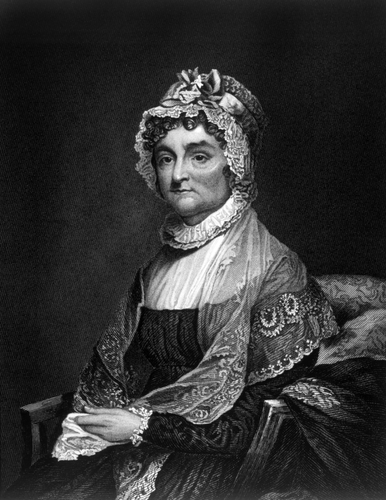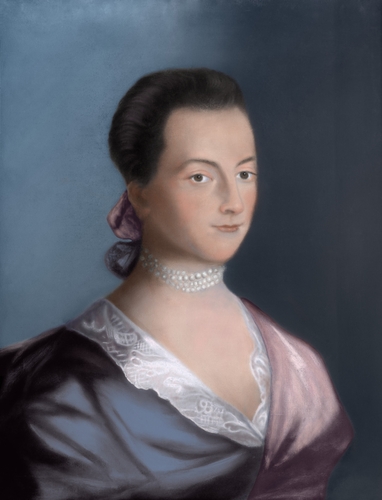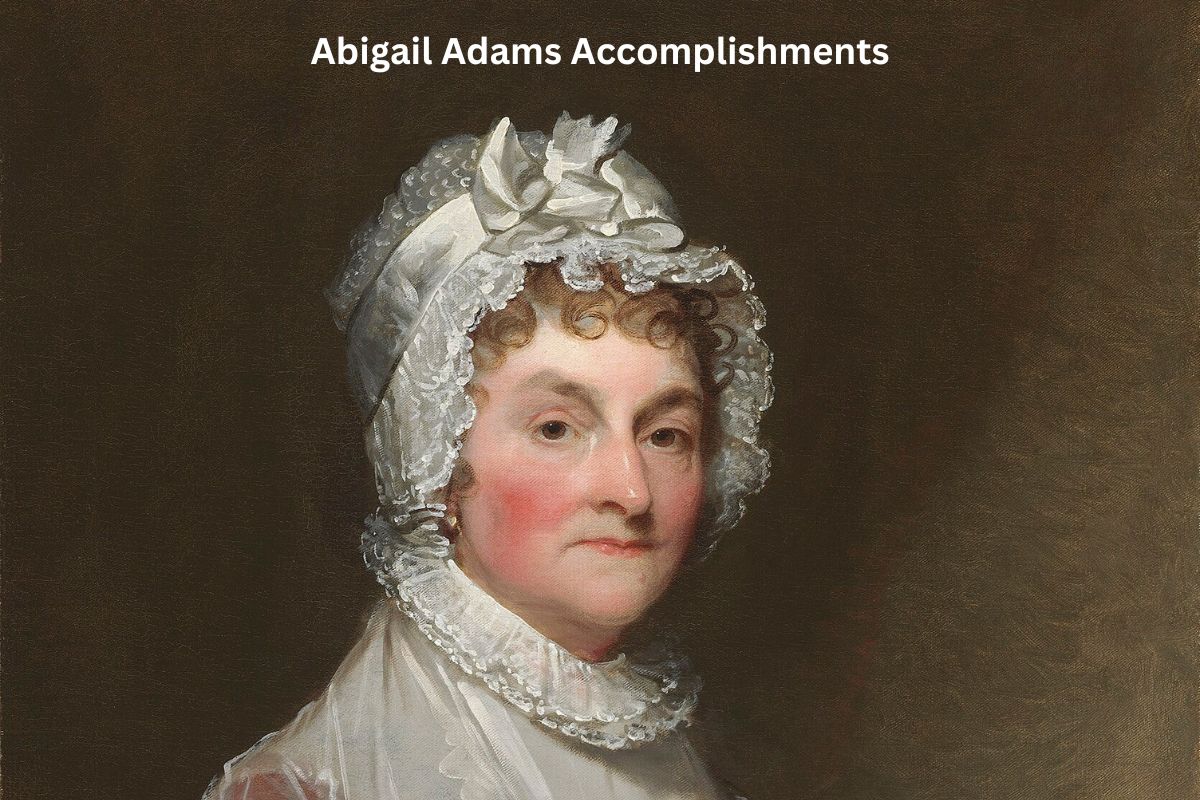Abigail Adams, born in 1744, was the wife of John Adams, the second U.S. President, and mother of John Quincy Adams, the sixth President.
She is known for her extensive and insightful correspondence, particularly with her husband, providing a unique view of the Revolutionary War era.
A strong advocate for women’s rights and education, she famously urged her husband to “remember the ladies” in new laws, making her an early figure in the American women’s rights movement.
Her legacy is marked by her intellectual depth, political insight, and advocacy for gender equality.
Accomplishments of Abigail Adams
1. First Lady of the United States
Abigail Adams became the First Lady when her husband, John Adams, assumed the presidency in 1797. During her time in this role, she made a significant impact on the position and the early history of the United States.
She was the first woman to hold the title of “First Lady,” as the term was not yet in common use, and she helped to define the role for future presidential spouses.
Also Read: Facts About Abigail Adams
As First Lady, Abigail Adams was known for her gracious hospitality and social gatherings. She hosted numerous events at the President’s House (now known as the White House) and played a pivotal role in the nascent capital city of Washington, D.C.
Her ability to bring people together and create a sense of unity during a politically tumultuous time was widely admired.

2. Advocate for women’s rights
Abigail Adams was a passionate advocate for women’s rights and gender equality at a time when such ideas were relatively uncommon.
In a famous letter to her husband John Adams in March 1776, as he was participating in the drafting of the Declaration of Independence, she urged him to “remember the ladies” and to consider women’s rights and their interests when shaping the laws of the new nation.
Also Read: Timeline of Abigail Adams
While her plea was not immediately heeded, her words became a symbol of early feminist thought and contributed to the ongoing conversation about women’s rights in the United States.
Abigail Adams’ advocacy laid the foundation for future women’s rights activists and feminists who would continue the struggle for equality.
3. Promoted education for her children
Abigail Adams was a strong advocate for education, particularly for her own children. She believed that a well-rounded education was essential for her offspring and played an active role in their intellectual development.
She personally tutored her children, including her son John Quincy Adams, in subjects such as history, literature, and languages.
Abigail Adams corresponded extensively with her children, encouraging them to read widely and engage in intellectual pursuits.
Her commitment to education had a profound impact on her son John Quincy Adams, who would go on to become the sixth President of the United States and a distinguished statesman.
Her dedication to education emphasized the importance of learning and knowledge in the Adams family, leaving a lasting legacy in American history.
4. Advised her husband, John Adams, on political matters
Abigail Adams was not just a supportive wife but also a trusted political advisor to her husband, John Adams. She possessed a keen intellect and a deep interest in political matters, which made her an invaluable source of advice during a critical period in American history.
Throughout her husband’s career, Abigail Adams provided him with valuable insights and opinions on political issues. Her counsel was highly respected, and John Adams frequently sought her guidance.
Their correspondence, filled with discussions on political philosophy and strategy, reveals the extent of her influence on his decisions and actions.

5. Prolific author and correspondent
Abigail Adams was a prolific writer and correspondent. Her letters and writings provide a rich historical record of her time and her personal thoughts on various subjects.
Her correspondences with her husband, family members, and friends offer valuable insights into the social, political, and cultural dynamics of the late 18th century.
Abigail Adams’ letters are known for their eloquence, intelligence, and wit. Her writings not only documented her own life but also contributed to the broader discourse of her era. Her letters have been studied and admired for their historical significance and literary quality.
6. Early anti-slavery activist
Abigail Adams was an early advocate against slavery, and she expressed her opposition to the institution in her writings. She believed that slavery was morally wrong and incompatible with the principles of liberty and equality upon which the United States was founded.
In her letters, Abigail Adams condemned the practice of slavery and advocated for its abolition. Her anti-slavery views were relatively progressive for her time, and her stance contributed to the growing abolitionist movement in the early United States.
While slavery persisted for many years after her advocacy, her outspokenness helped shape the moral and political conversations surrounding the issue.
7. Strong supporter of American independence
Abigail Adams was a staunch supporter of American independence from British rule. She and her husband, John Adams, were both dedicated patriots who believed in the cause of American self-determination.
Abigail Adams often provided encouragement and emotional support to her husband and other American leaders during the difficult and tumultuous years of the American Revolution.
Her unwavering commitment to the cause of independence was evident in her correspondence and actions. She endured personal hardships and sacrifices during the war, including the separation from her husband as he traveled for diplomatic and political duties.
Abigail’s support for independence was not just symbolic but demonstrated through her resilience and dedication to the revolutionary cause.
8. Engaged in public discussions and social events
As First Lady, Abigail Adams played a prominent role in the social and political life of the young United States.
She was known for her gracious and inclusive hospitality at the President’s House (the early White House) in Philadelphia and later in Washington, D.C.
Her gatherings and receptions brought together people from various backgrounds and political affiliations, fostering a sense of unity during a critical period in American history.
Abigail Adams used these social events as opportunities for political discussions and the exchange of ideas. She engaged in conversations about the future of the nation, which contributed to the development of early American politics and diplomacy.
9. Advocated for improved healthcare practices
Abigail Adams had a keen interest in healthcare and hygiene, which was somewhat ahead of her time. She advocated for improved healthcare practices and sanitation in her personal life and in her correspondence.
Her concern for the health and well-being of her family was evident in her letters, where she discussed topics related to medicine, vaccination, and overall well-being.
Her advocacy for better healthcare practices reflected a broader awareness of the importance of public health, which would become increasingly relevant as the United States expanded and faced various health challenges in the years to come.
10. Left a lasting legacy in American history
Abigail Adams left a lasting legacy in American history as a pioneering woman who defied the conventions of her time. Her advocacy for women’s rights, her political influence, and her dedication to important causes all continue to be celebrated and studied today.
Her correspondence with her husband and others offers valuable insights into the social, political, and cultural context of the late 18th century. Abigail Adams’ letters and writings have been preserved and analyzed, contributing to a deeper understanding of the early United States and the role of women in its history.
Additionally, her commitment to education and her influence on her son, John Quincy Adams, who became President of the United States, underscores her enduring impact on American society and politics. Abigail Adams’ legacy as a trailblazer for women’s rights and as an influential figure in early American history continues to inspire and inform generations of Americans.
